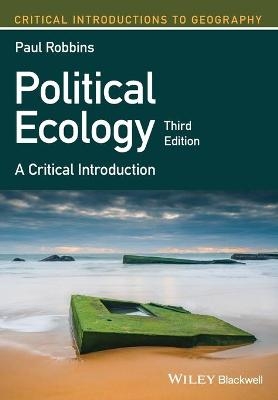
Political Ecology
Wiley-Blackwell (Verlag)
978-1-119-16744-0 (ISBN)
The third edition of Political Ecology spans this sprawling field, using grounded examples and careful readings of current literature. While the study of political ecology is sometimes difficult to fathom, owing to its breadth and diversity, this resource simplifies the discussion by reducing the field down into a few core questions and arguments. These points clearly demonstrate how critical theory can make pragmatic contributions to the fields of conservation, development, and environmental management.
The latest edition of this seminal work is also more closely focused, with references to recent work from around the world. Further, Political Ecology raises critical questions about “traditional” approaches to environmental questions and problems. This new edition:
Includes international work in the field coming out of Europe, Latin America, and Asia
Explains political ecology and its tendency to disrupt the environmental research and practice by both advancing and undermining associated fields of study
Contains contributions from a wide range of diverse backgrounds and expertise
Offers a resource that is written in highly-accessible, straightforward language
Outlines the frontiers of the field and frames climate change and the end of population growth with the framework of political ecology
An excellent resource for undergraduates and academics, the third edition of Political Ecology offers an updated edition of the guide to this diverse, quickly growing field that is at the heart of how humans shape the world and, in turn, are shaped by it.
Paul Robbins is the dean of the Nelson Institute for Environmental Studies at the University of Wisconsin-Madison, USA, where he guides the institute in serving as a world leader in addressing rapid global environmental change. With writing focused on diverse interdisciplinary audiences and the broader public, he is author of the award-winning book Lawn People: How Grasses, Weeds, and Chemicals Make Us Who We Are (2007), widely recognized as one of the most accessible books on the environmental politics of daily life.
Preface vi
Acknowledgments viii
Introduction 1
1 Political versus Apolitical Ecologies 8
2 A Tree with Deep Roots 22
3 The Critical Tools 45
4 Political Ecology Emerges 82
5 Challenges in Ecology 99
6 Challenges in Social Construction 118
7 Challenges in Explanation 137
8 Degradation and Marginalization 149
9 Conservation and Control 168
10 Environmental Conflict 190
11 Environmental Subjects and Identities 206
12 Political Objects and Actors 223
13 Political Ecologies of the Future? 236
Bibliography 245
Index 280
| Erscheinungsdatum | 29.11.2019 |
|---|---|
| Reihe/Serie | Critical Introductions to Geography |
| Verlagsort | Hoboken |
| Sprache | englisch |
| Maße | 170 x 241 mm |
| Gewicht | 544 g |
| Themenwelt | Naturwissenschaften ► Biologie ► Ökologie / Naturschutz |
| Sozialwissenschaften ► Politik / Verwaltung ► Staat / Verwaltung | |
| Wirtschaft ► Volkswirtschaftslehre ► Wirtschaftspolitik | |
| ISBN-10 | 1-119-16744-2 / 1119167442 |
| ISBN-13 | 978-1-119-16744-0 / 9781119167440 |
| Zustand | Neuware |
| Haben Sie eine Frage zum Produkt? |
aus dem Bereich


